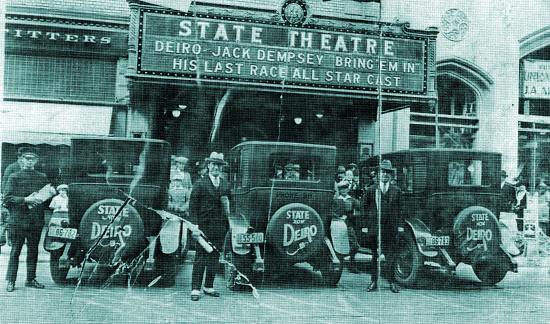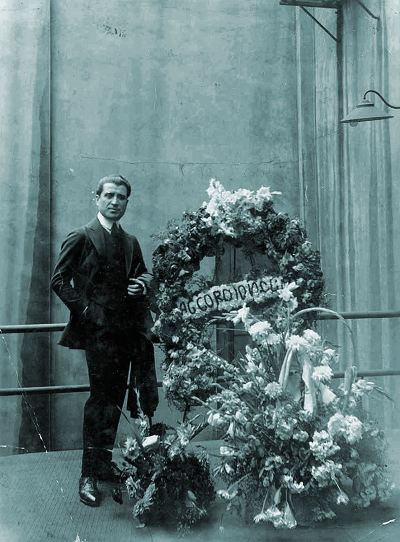
Guido Deiro was so popular that taxicabs advertised his appearance at the State Theatre when he shared billing with Jack Dempsey. Photo courtesy of The Deiro Archive at CUNY.
-- Biaggio Quattrociocche, music publisher
Guido was a terrific accordion artist and a very patient teacher. It is sad that he had to get sick and pass away so young. He was a great man and did a lot for the accordion; he helped popularize it in the United States and Europe. He was a household name over the entire nation for many years. One could just say Guido Deiro, and every accordion lover knew who he was. May his name live on forever.
-- John Barsuglia, student and business associate of Guido Deiro
Soon after Pietro Frosini was discovered by a talent scout for the Orpheum Vaudeville Circuit, he met Guido Deiro. Frosini felt that Guido had done much to originate a pleasing style of playing popular songs that helped make the transition form the accordion being seen as a novelty to an instrument that found its way into the hearts of the American public. Frosini was so impressed by Guido's renditions of popular songs such as Alexander's Ragtime Band, Everybody's Doing It, etc., that it caused Frosini to change his programs from strictly classical to those having popular songs. . . Frosini originally played a button-type chromatic accordion. Later, Guido Deiro influenced him to change to a piano-type keyboard (in appearance only) with dummy black keys and three tiers of white keys for the treble. The accordion was still a chromatic keyboard, though it looked like a piano-accordion.
-- Ronald Flynn, Edwin Davison, Edward Chavez, The Golden Age of the Accordion (Schertz, Texas, Flynn Publications: 1992), 7.
 Congratulatory bouquet from an opening night |
I was twelve years old when he died in 1950. He had semi-retired to the Los Angeles area, opened a small music store, and taught gifted students whom he referred to as his "prot g s." I had by then, of course, absorbed some culture and enjoyed listening to classical, as well as contemporary music. Each day, my father would take up his accordion, which I believe was an Acme of custom manufacture. It had an extra row of left hand buttons for augmented fifth chords, and a number of shifts, some of which were on the outside of the keyboard.
He would never do scales or exercises, but instead would roll into certain pieces that were technically difficult and obviously popular to him. These included the Hungarian Rhapsodies, Czardas, Tango Jealousia, Torno a Sorrento, and once in a while a popular tune. He played everything as if he were standing in front of 2000 people. Pieces were always played from start to finish, and he never interrupted them to replay or practice a passage. To be truthful, I never heard him miscue.
I can close my eyes and hear his music now as clearly as it were forty years ago. I didn't appreciate it at the time, but my father was also a craftsman. He did all of his own reed work, and I can recall the little workshop that he used with his glue pots and wood. He had been forced to repair his instruments when he was in vaudeville because at that time very few people, other than a few piano makers, had any idea how to construct or repair an accordion.
My father attempted on several occasions to get me interested in the accordion, but to no avail as I realized even then he would be a tough act to follow. To me, it appeared impossible to even think of being able to play the accordion in a manner that would be acceptable to him. I'm sorry now that I was intimidated to the point where I didn't take the instrument up seriously. When it came time to practice, I always managed to be off somewhere riding my bicycle. His efforts did not produce an accordion player, but it did bring out in me a deep appreciation for music in all of its forms and the genius it takes to create it.
Along with his reputation as a great artist, he had another one as a womanizer. Many people are familiar with his long relationship with Mae West. He is mentioned prominently in her autobiography, Goodness Had Nothing To Do With It. Along with his music, I can also remember the beautiful women that surrounded him, including my mother Yvonne. My father was 54 when he married my mother, who was at the tender age of 16. He had been dating her mother who was an opera singer. Father never let a pretty ankle go by without serious consideration.
It's a tragedy for anyone to lose their father at such an early age. I am more fortunate that most because when feelings of sadness and loss come upon me, I can select one of his recordings and as it plays, his vitality and love fill the room and touch me. He still lives in his music and compositions.
-- Count Guido Roberto Deiro
ITAL0-AMERICAN ACCORDION MFG. CO.
A. Piatanesi, B. Piatanesi, J.C. Piatanesi and D. Petromilli
3137 West 51st. Street
Chicago 32, Illinois
Telephone PROspect 2992
August 1, 1950
Mr. Anthony Galla-Rini
4400 Corliss St.
Los Angeles 41, California
Dear Tony:
We received your letter today, and we are very sorry to hear that Guido passed away, we didn't realize how ill he had been, and it came somewhat expectedly [sic].
He is one, whom the accordion people will never forget, because as you requested to know, it was Guido who was the first to play the right hand piano keyboard in this country. This we are positive. However, you asked that Demo should think carefully back when he was in San Francisco, well he says that it was Guido for the first in this country, but Pietro was first to appear in San Francisco with the piano keyboard because Guido was elsewhere in Seattle or traveling. Guido was first in this country to play the piano keyboard right hand, and Pietro coming later, appeared in S. Francisco [sic] shortly before Guido did, so he was first in San Francisco only. This is indeed a fact that should appear in Guido's memoirs. [sic]
Thanks for the information regarding your bass being in five sets of reeds.
We all send our best wishes to you and your family,
Sincerely,
B. Piatanesi [signed]
Italo-American Accordion Mfg. Company
Comment by Count Guido Robert Deiro:
The previous letter was typewritten and dated August 1, 1950 (two weeks after the demise of my father), and hand signed by B. Piatanesi.
Petromilli and the Piatanesi Bros. were the co-owners of the Guerrinni Accordion Factory, along with Columbo, in San Francisco in the early 1900's and were the makers, under the direction of my Uncle Pietro and Guido, of the first piano-accordions in America. Uncle Pietro had brought a damaged Italian instrument, bought by my father in Germany, from Seattle, where Dad was playing at the Jackson Saloon, to San Francisco to have it repaired and modified. They had already sent it once and it had come back unplayable, so Pietro accompanied it the second time. Dad played Guerinni exclusively up until the brothers started the Italo-American Accordion Company in Chicago in the Thirties.
| Back | Next |